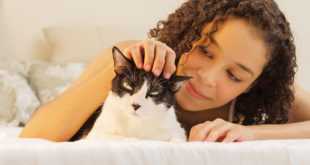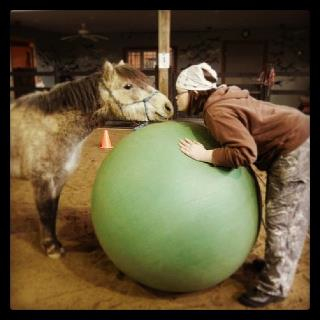Why Do We Fall? So We Learn To Get Back On by Blair McKissock, MSEd, RYT
You are never a real horse person until you fall off and get back on. At least that is what I have been told my entire life. Working with horses both on the ground and under saddle can be dangerous; bones can be broken, and people have even lost their lives. Yet that doesn’t stop people from riding and loving them. Everyone falls yet not everyone is able to get back up. So why do we fall? Why do we have to feel pain and frustration followed by the fear and trepidation that it might happen again? It hurts to hit the ground! Who would want to feel that again? Something worse might happen next time. These are the thoughts that begin to fill our heads when something bad happens to us. So what is it that makes us resilient enough to get back up?
I was told after the first time I fell off a horse that we fall so that we learn to stand back up, brush the dust and dirt away, and get back on the horse to try again. I was going over my first major jump. Of course it may have only been three feet, but in my head, it was at least four and a half feet high. I lined the horse up perfectly but took off just a half stride too late, so when the horse landed I was catapulted right off. Funny thing was that I landed on my feet, then my bum, then my head. It was quite a graceful landing if you can imagine. The impact was ferocious. I had no idea being thrown would feel like that. I even cracked my helmet. As I was lying on the ground, the horse was looking down at me as if to ask, “What are you doing down there?” I was none the worse for wear so I jumped up, still pulsing with adrenaline reverberating through my body, and climbed back on. The way my trainer acted it was as if that was the only thing to do. She asked if anything was broken, complimented my unique landing, and put her hands together in a leg up and over gesture. So I rode the horse around again for the approach, and went over with a picture perfect landing. It was at that moment that I felt total exhilaration for the accomplishment, though there was still some lingering fear.
This begs the question about how important is it to get back up after you fall? Why do we continue to feel fear? We all have times in our lives where scary things, unpredictable things happen that create fear. Horses are attacked by predators in the wild on a daily basis, yet they return to grazing moments after the danger passes. You will see them tremble after a traumatic event and shake as if drying their coat after a bath. In a wild herd, if the horse held onto the fear, and lived their life in a state of anxiety they would die. Humans seem to hold their fear in their body. Among researchers who study somatics, there is a widely held belief that we hold that fear in our bodies. When we hurt part of our body, we tend to continue holding in the muscles surrounding it even long after the pain has passed. The emotion of fear becomes locked deep in the tissue as if in anticipation that pain will come again if the muscles let loose. This holding in can create long term chronic pain as we move awkwardly, and the muscles in our body try to compensate. We sometimes also lose trust; trust in the world around us. We live in anticipation that whatever happened will in some way happen again but unexpectedly.
This creates anxiety, and the amygdala releases stress hormones in response. We then learn to live in a state of complete anxiety, and the amygdala responds, secreting more stress hormones, creating a self-perpetuating cycle of anxiety, and hypervigilance, and the resulting emotion is fear. This would be like a horse living in flight mode 24 hours a day. Additionally, if you subscribe to the belief of neural congruency or resonance, then everyone that is around when we are in that state feels this hyperawareness and fear, including animals. The theory of resonance states that when we spend enough time with other people and animals, we begin to resonate with their emotions. If the emotions are fear-based, then others may choose to disengage from relationships, making us feel even more isolated. So far fear has brought physical pain, anxiety, lack of trust, and potentially isolation. This can happen in different degrees to anyone who experiences adverse experiences or trauma, from the simplest fall off a horse to significant trauma.
If we fall to get back up, then why are there some that don’t get up, and some that do? How can we pick ourselves up and overcome the fear? There is no easy way to answer this since every human has different degrees of resiliency. Researchers like Dr. Brene Brown, Dr. Cal Crow, and Dr. Norman Garmezy have taken a look at what makes some people more likely to dust off and get back in the saddle, and why others are stuck in fear. One thing that is common across the board is a positive attitude before an event happens. Those who have a general positive outlook are more likely to recover from an event faster, and with less long term impact than someone who is depressed. Other traits include solid support systems and encouragement, an overall outlook that adverse events are temporary, flexibility, and a tendency toward action. Courage is not the absence of fear, but is that ability to act in spite of it. We can cultivate those resilience skills by learning how to breathe more fully, operating from a place of gratitude, learning to release physical fear through yoga and activity. If we are still carrying around old adverse childhood experiences, we can learn to release them by adopting and practicing those same skills. Riding can be a fabulous way to release old fear. Horses can be amazing and supportive guides through the process, as they don’t judge and respond to our emotions holding a mirror to those things we choose not to see. The act of riding opens up the body to release fear and trauma on a cellular level through the movement of their gaits, and our bodies’ response to the movement. They allow us to develop courage in the face of fear.
When we learn to physically and mentally pick ourselves up and get back on the metaphorical horse, we strengthen those skills of resilience. When we act in spite of our fear, we are less likely to hold onto it after the event, and are better able to shake off the excess adrenaline hormones and return to grazing just like our herd of wild horses. So the next time you fall, remind yourself that it is an opportunity to pick yourself back up.
Blair McKissock, MSEd, RYT is a speaker and author on experiential and nature-based learning. She loves sharing the amazing world of equine-assisted learning and therapies through her work at Strides to Success in Plainfield, Indiana. You can learn more about coaching, OmHorse mounted yoga sessions, and upcoming equine-assisted workshops at stridestosuccess.org.
 Conscious Community Magazine Dedicated to Elevating Consciousness
Conscious Community Magazine Dedicated to Elevating Consciousness





